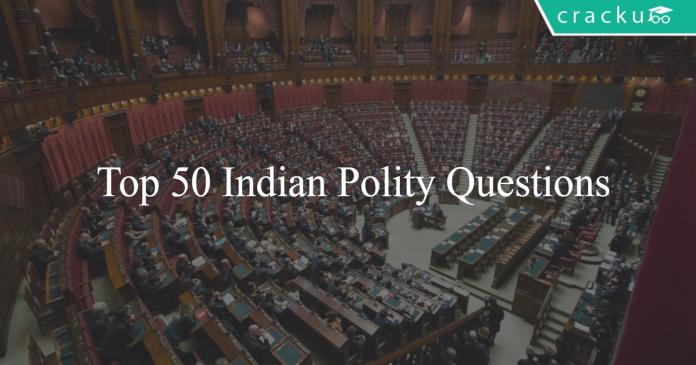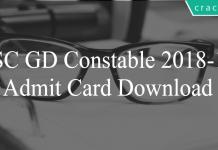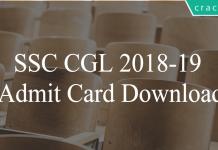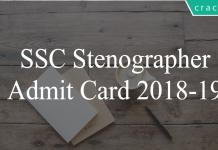Top 50 Indian Polity Questions for SSC Exams (CGL, CHSL, JE, CPO, MTS, GD, Steno)
Download SSC Polity questions with answers PDF based on previous papers very useful for SSC CGL, CHSL, JE, Stenographer, MTS, CPO, JE, GD exams. 50 Very important Polity objective questions (MCQ’s) for SSC exams.
Download Top 50 Indian Polity Questions PDF
25 SSC CGL Mocks – Just Rs. 149
Question 1: The legislature gains a priority over the executive in which government?
a) A Presidential Government
b) A Federal Government
c) An Authoritarian Government
d) A Parliamentary Government
Question 2: What is the minimum age for being elected as the President of India?
a) 40 years
b) 35 years
c) 30 years
d) 25 years
Question 3: Who administers oath of the office and secrecy to the Vice President of India?
a) Prime Minister
b) Chief Justice of Supreme Court
c) President
d) Lok Sabha Speaker
Question 4: Who appoints Union Council of ministers ?
a) Speaker
b) Chief Justice of Supreme Court
c) Vice President
d) President
Question 5: – Which part of Indian constitution deals with Union Territories?
a) Part VI
b) Part VII
c) Part VIII
d) Part IX
SSC CGL Previous Papers Download PDF
SSC CHSL PREVIOUS PAPERS DOWNLOAD
Question 6: – Which Article of Indian Constitution empowers Indian Parliament to amend the constitution?
a) Article 368
b) Article 252
c) Article 254
d) Article 256
Question 7: Under which Article of Indian Constitution an emergency can be declared on the grounds of failure of constitutional machinery in the States?
a) Article 350
b) Article 352
c) Article 356
d) Article 368
Question 8: According to Article 80 of Indian Constitution, Rajya Sabha can have a maximum strength of 250 members. Out of these 250 members how many are representatives of States and Union Territories ?
a) 230
b) 236
c) 238
d) 242
Question 9: The 42nd Amendment of the Constitution of India was enacted in the year ________.
a) 1947
b) 1976
c) 1991
d) 2016
Question 10: Which Schedule of Indian Constitution has provisions relating to disqualification of Member of Parliament on the ground of defection?
a) Seventh Schedule
b) Eighth Schedule
c) Ninth Schedule
d) Tenth Schedule
18000+ Questions – Free SSC Study Material
Question 11: According to Article 75 of Indian Constitution, the ministers are collectively responsible to the Parliament in general and to whom in particular.
a) People
b) Lok Sabha
c) Rajya Sabha
d) President
Question 12: There are three types of lists in Indian Constitution, viz., the Union List, the State list and the _____.
a) District List
b) Panchayat List
c) Concurrent List
d) No option is correct
Question 13: Which Part of Indian Constitution deals with Centre-State financial relations?
a) Part X
b) Part VIII
c) Part XII
d) Part XX
Question 14: Article 360 of Indian Constitution, empowers whom to proclaim a Financial Emergency?
a) The Finance Minister of India
b) The Governor of Reserve Bank of India
c) The President of India
d) Defence Minister of India
Question 15: Which Constitutional Amendment Act gave constitutional recognition to the panchayats ?
a) 72nd Constitutional Amendment Act
b) 73rd Constitutional Amendment Act
c) 74th Constitutional Amendment Act
d) 75th Constitutional Amendment Act
Question 16: Which pillar of Indian Constitution is its final interpreter?
a) The Executive
b) The Legislative
c) The Judiciary
d) No option is correct.
Question 17: As per John Locke, an English philosopher and physician, which is not a Natural Right?
a) Liberty
b) Equality
c) Property
d) Right to Vote
Question 18: Which Schedule of Indian Constitution was added by 73rd Constitutional Amendment Act?
a) Eight Schedule
b) Ninth Schedule
c) Tenth Schedule
d) Eleventh Schedule
Question 19: Under which Article of Indian Constitution a citizen can move to the Supreme Court of India if his Fundamental Rights are breached?
a) Article 21
b) Article 1
c) Article 32
d) Article 226
Question 20: Temporary Provisions with respect to the state of Jammu and Kashmir is given in which Article of Indian Constitution?
a) Article 350
b) Article 360
c) Article 370
d) Article 380
Question 21: Part of XVII of India Constitution deals with ______.
a) elections
b) official language
c) Panchyat
d) fundamental rights
Question 22: If any Fundamental Right of a citizen is breached then under Article 226 of Indian Constitution he can move to ______.
a) Prime Minsiter of India
b) Chief Justice of India
c) President of India
d) High Court of State
Question 23: In India, who is also known as ‘the guardian of the public purse’?
a) Comptroller and Auditor General of India
b) Prime Minister of India
c) Chief Justice of India
d) Ministry of law and Justice
Question 24: Who can make laws for Union Territories on any subject under the three lists Viz. union list,
state list and concurrent list?
a) The President of India alone
b) The Parliament
c) The Prime Minister of India
d) Home Minister of India
Question 25: With whose consultation does the President convene and prorogue all sessions of Parliament ?
a) The Speaker
b) The Prime Minister
c) The Prime Minister and the leader of the opposition in Lok Sabha
d) The Council of Ministers
1500+ Free SSC Questions & Answers
Question 26: The word “Secular” was added to the Preamble of the Constitution of India by which Constitutional Amendment?
a) 41st Constitutional Amendment
b) 42nd Constitutional Amendment
c) 43rd Constitutional Amendment
d) 44th Constitutional Amendment
Question 27: Lok Sabha Secretariat comes under the direct control of
a) Ministry of Home Affairs
b) Ministry of Parliamentary Affairs
c) Speaker of Lok Sabha
d) President
Question 28: If a budget is defeated in the legislature of a state then
a) The Finance Minister alone has to resign
b) The Finance Minister concerned has to be suspended
c) The council of Ministers along with the Chief Minister has to resign
d) Re-election have to be ordered
100+ Free GK Tests for SSC Exams
Question 29: The power of the Supreme Court of India to decide disputes between the Centre and the States falls under its
a) Advisory jurisdiction
b) Original jurisdiction
c) Appellate jurisdiction
d) Jurisprudence
Question 30: Ideas of welfare state are contained in
a) Fundamental Rights
b) Directive Principles of State Policy
c) Preamble of the Constitution
d) Part VII
Question 31: The Speaker of Lok Sabha addresses his letter of resignation to the
a) President of India
b) Prime Minister
c) Deputy Speaker of Lok Sabha
d) The Chief Justice of India
Question 32: The Chairman of the Public Accounts Committee of the Parliament is appointed by the
a) President of India
b) Prime Minister of India
c) Speaker of Lok Sabha
d) Chairman of Rajya Sabha
Question 33: The minimum number of members that must be present to hold the meeting of the Lok Sabha is
a) One-fourth of the total membership
b) One-tenth of the total membership
c) Fifty percent strength of the Lok Sabha
d) At least hundred members
Question 34: “Betting and gambling” is listed in which list given in the Seventh Schedule in the Constitution of India.
a) Union
b) State
c) Global
d) Concurrent
Question 35: Which Fundamental Right in the Indian Constitution includes abolition of untouchability?
a) Right to Liberty and Personal Freedom
b) Right to Freedom of Religion
c) Right to Equality
d) Cultural and Educational Rights
Question 36: Name the Commission that came to India in 1928 to reform India’s constitutional system.
a) Rowlatt Act
b) Pitt’s India Act
c) Partition of Bengal
d) Simon Commission
Question 37: Under which jurisdiction the President of India can refer any matter that is of public importance or that which involves interpretation of Constitution to Supreme Court for advice?
a) Original Jurisdiction
b) Writ Jurisdiction
c) Appellate Jurisdiction
d) Advisory Jurisdiction
Question 38: India has taken the concept of ‘Judicial Review’ from which country’s constitution?
a) United States
b) United Kingdom
c) Canada
d) Ireland
Question 39: Which Country doesn’t have a written Constitution?
a) United Kingdom
b) Australia
c) United States of America
d) Bangladesh
Question 40: How many members of upper house (Rajya Sabha) can be nominated by President of India?
a) 10
b) 12
c) 14
d) 16
Question 41: Who appoints Governor of a state in India?
a) Prime Minister of India
b) Council of Minister
c) Judge of Supreme Court
d) President of India
15000 Questions – Free SSC Study Material
Question 42: Who is the executive head of the state in India?
a) Prime Minister
b) President
c) Cabinet Secretary
d) Finance Secretary
Question 43: Who administers the oath of the President of India?
a) Governor General of India
b) Chief Justice of India
c) Prime Minister of India
d) Vice President of India
Question 44: Part IV of constitution of India deals with which issue?
a) The Union
b) The States
c) Fundamental Rights
d) Directive Principles of State Policy
Question 45: How many Fundamental Duties are mentioned in Indian constitution?
a) Five
b) Seven
c) Nine
d) Eleven
Question 46: How many types of writ are there in the Indian Constitution?
a) 5
b) 4
c) 3
d) 2
Question 47: Whose recommendation is mandatory to impeach the President of India from his office before the completion of his/her term?
a) The Prime Minister
b) The Speaker of the Lok Sabha
c) The Chief Justice of India
d) The two houses of the parliament
Question 48: Which bill cannot originate in Rajya Sabha?
a) Constitutional Amendment Bill
b) Ordinary Bill
c) Fundamental Bill
d) Money Bill
Question 49: The drafting committee wrote the Indian Constitution in which language?
a) English and Hindi
b) Only English
c) English and Urdu
d) English, Hindi and Urdu
Question 50: How many seats are reserved for representatives of Scheduled Castes and Scheduled Tribes in Lok Sabha?
a) 39
b) 85
c) 109
d) 131
Download Current Affairs Questions & Answers PDF
Answers & Solutions:
1) Answer (D)
2) Answer (B)
3) Answer (C)
Chief Justice of Supreme Court
4) Answer (D)
President
5) Answer (C)
6) Answer (A)
7) Answer (C)
8) Answer (C)
9) Answer (B)
10) Answer (D)
11) Answer (B)
12) Answer (C)
13) Answer (C)
14) Answer (C)
15) Answer (B)
16) Answer (C)
17) Answer (D)
18) Answer (D)
19) Answer (C)
20) Answer (C)
21) Answer (B)
22) Answer (D)
23) Answer (A)
24) Answer (B)
25) Answer (B)
26) Answer (B)
27) Answer (C)
28) Answer (C)
29) Answer (B)
30) Answer (B)
31) Answer (C)
32) Answer (C)
33) Answer (B)
34) Answer (B)
35) Answer (C)
36) Answer (D)
37) Answer (D)
38) Answer (A)
39) Answer (A)
40) Answer (B)
41) Answer (D)
42) Answer (B)
43) Answer (B)
44) Answer (D)
45) Answer (D)
46) Answer (A)
47) Answer (D)
48) Answer (D)
49) Answer (A)
50) Answer (D)
DOWNLOAD APP FOR SSC FREE MOCKS
We hope this Indian Polity questions for SSC Exam will be highly useful for your preparation.





